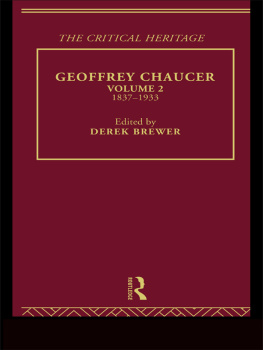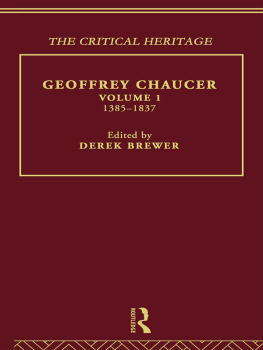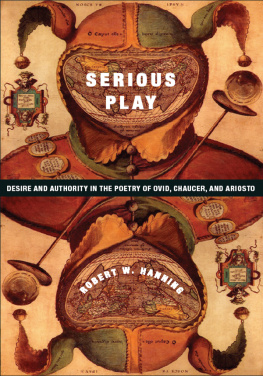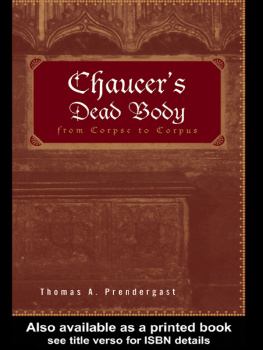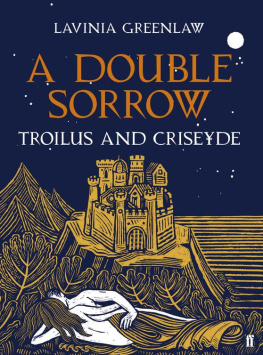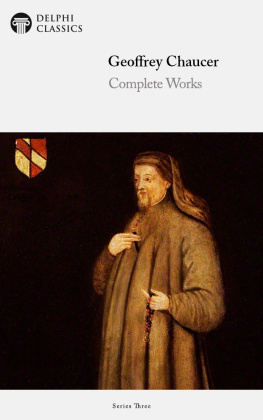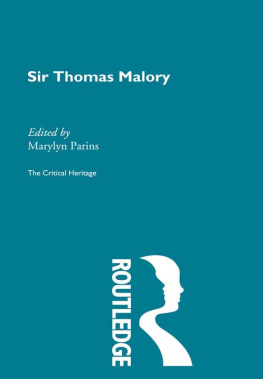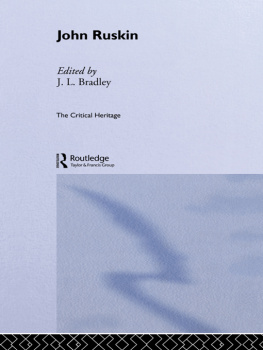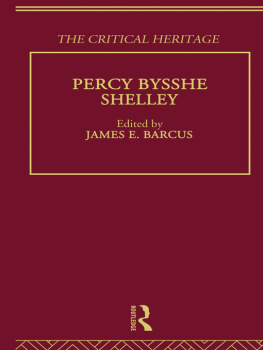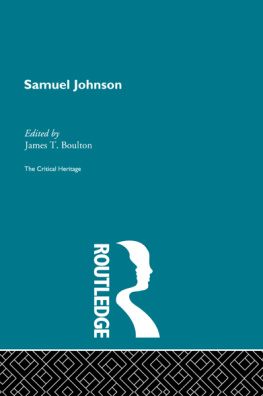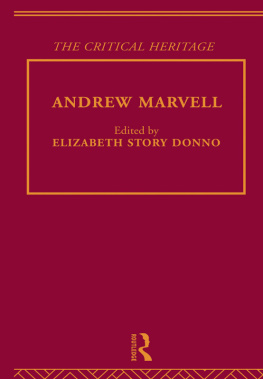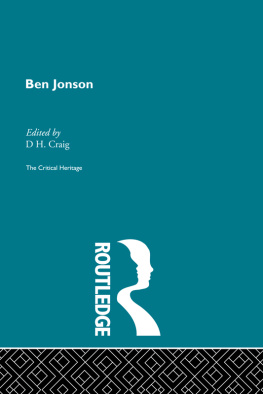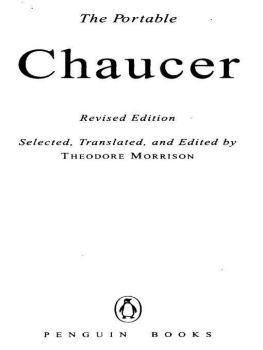Chaucer Geoffrey - Geoffrey Chaucer
Here you can read online Chaucer Geoffrey - Geoffrey Chaucer full text of the book (entire story) in english for free. Download pdf and epub, get meaning, cover and reviews about this ebook. City: Boston;London, year: 1978;2011, publisher: Routledge & K. Paul, genre: Detective and thriller. Description of the work, (preface) as well as reviews are available. Best literature library LitArk.com created for fans of good reading and offers a wide selection of genres:
Romance novel
Science fiction
Adventure
Detective
Science
History
Home and family
Prose
Art
Politics
Computer
Non-fiction
Religion
Business
Children
Humor
Choose a favorite category and find really read worthwhile books. Enjoy immersion in the world of imagination, feel the emotions of the characters or learn something new for yourself, make an fascinating discovery.
- Book:Geoffrey Chaucer
- Author:
- Publisher:Routledge & K. Paul
- Genre:
- Year:1978;2011
- City:Boston;London
- Rating:3 / 5
- Favourites:Add to favourites
- Your mark:
- 60
- 1
- 2
- 3
- 4
- 5
Geoffrey Chaucer: summary, description and annotation
We offer to read an annotation, description, summary or preface (depends on what the author of the book "Geoffrey Chaucer" wrote himself). If you haven't found the necessary information about the book — write in the comments, we will try to find it.
Geoffrey Chaucer — read online for free the complete book (whole text) full work
Below is the text of the book, divided by pages. System saving the place of the last page read, allows you to conveniently read the book "Geoffrey Chaucer" online for free, without having to search again every time where you left off. Put a bookmark, and you can go to the page where you finished reading at any time.
Font size:
Interval:
Bookmark:

The Critical Heritage series collects together a large body of criticism on major figures in literature. Each volume presents the contemporary responses to a particular writer, enabling the student to follow the formation of critical attitudes to the writers work and its place within a literary tradition.
The carefully selected sources range from landmark essays in the history of criticism to fragments of contemporary opinion and little published documentary material, such as letters and diaries.
Significant pieces of criticism from later periods are also included in order to demonstrate fluctuations in reputation following the writers death.
First Published in 1978
This edition published in the Taylor & Francis e-Library, 2004.
Compilation, introduction, notes and index 1978 Derek Brewer
All rights reserved. No part of this book may be reprinted or reproduced or utilized in any form or by any lectronic, mechanical, or other means, now known or hereafter invented, including photocopying and recording, or in any information storage or retrieval system, without permission in writing from the publishers.
British Library Cataloguing in Publication Data
ISBN 0-203-19623-6 Master e-book ISBN
ISBN 0-203-19626-0 (Adobe eReader Format)
ISBN 0-415-13399-8 (Print Edition)
The reception given to a writer by his contemporaries and near-contemporaries is evidence of considerable value to the student of literature. On one side we learn a great deal about the state of criticism at large and in particular about the development of critical attitudes towards a single writer; at the same time, through private comments in letters, journals or marginalia, we gain an insight upon the tastes and literary thought of individual readers of the period. Evidence of this kind helps us to understand the writers historical situation, the nature of his immediate reading-public, and his response to these pressures.
The separate volumes in the Critical Heritage Series present a record of this early criticism. Clearly, for many of the highly productive and lengthily reviewed nineteenth-and twentieth-century writers, there exists an enormous body of material; and in these cases the volume editors have made a selection of the most important views, significant for their intrinsic critical worth or for their representative qualityperhaps even registering incomprehension!
For earlier writers, notably pre-eighteenth century, the materials are much scarcer and the historical period has been extended, sometimes far beyond the writers lifetime, in order to show the inception and growth of critical views which were initially slow to appear.
In each volume the documents are headed by an Introduction, discussing the material assembled and relating the early stages of the authors reception to what we have come to identify as the critical tradition. The volumes will make available much material which would otherwise be difficult of access and it is hoped that the modern reader will be thereby helped towards an informed understanding of the ways in which literature has been read and judged.
B.C.S.
For Helena
The present volume takes up the criticism of Chaucer at the moment when a new accent of ultimately great importance begins to be heard: that of American, more strictly, US, criticism. The first comment is that of Emerson, who immediately strikes a fresh and characteristic note, though there is no sharp break with the preceding tradition. The last comment in this second volume is also by a scholar from the USA. It is taken from the first work of the learned and sympathetic Rosemond Tuve, heralding a new age of professionalism, a new recognition of the intellectual, artistic and social range of Chaucers poetry. Her contribution is notably more powerful, and more specialised, than that of her distinguished older contemporaries of that same year, though it maintains something of their gracefulness. The year 1933 was chosen as the terminus ad quem for critical comment because that year seemed to mark the decisive point of change in the balance between the amateur and professional criticism of Chaucer. It marks the point of overlap between the long tradition of the amateur criticamateur both as lover and as unprofessionaland the beginning of the professional, even scientific criticism in which the concept of the love of an author would too often appear ludicrous. About the early 1930s, too, and doubtless not accidentally, becomes more visible the beginning of the break-up of the long and honourable traditions of Neoclassical and Romantic criticism which were so closely connected with the critics status of gentleman-amateur. From the middle 1930s onwards, the professional criticism of Chaucer by salaried academics, not gentlemen (which had of course begun in a small way in the nineteenth century), now dominates. This is not to deny a professional competence, where it is needed, to the great figures in Chaucer criticism whose work fills the latter pages of this volume: but their work retains an air of almost innocent pleasure in and zest for literature, a certain elegance of style, an appeal to the educated common reader, which, though not entirely lost in more recent years, are hardly marked characteristics of the modern Chaucer industry. The overlapping of the amateur and the professional in the work that appears in the latter pages of the present volume produced the best criticism we have, which can and should be read not only in historical perspective but for its direct illumination of Chaucers quality and its own learning and humanity.
It may be remarked, however, that the twentieth-century comments collected here do not often derive from the general periodicals, written for non-specialist readers, which provide the main source of comment in the nineteenth century. The contributions of Huxley, Virginia Woolf, and Praz were indeed published in general literary periodicals, but they are in a minority, and most of the extracts are drawn from specialist journals or similar sources, though they are far less technical in tone, and of much broader appeal, than such writings would normally be today.
In the development from amateur to professional we see some of the paradoxes of twentieth-century culture. The more professional criticism at its best may be, because more specialised, more learned and penetrating, less simply a reflection of current predispositions. Furthermore, the great increase of education and the now fully accepted study of vernacular literature as a university discipline and a desirable educational tool in schools, have ensured that a higher proportion of the population of Great Britain has at least had a brush with Chaucer at school, and have made professional criticism possible by providing jobs. On the other hand, the prestige and quality of general literary culture have declined in society as a whole relative to other interests, notably science and sport, while modern literary culture itself appears to be going through a phase of hostility to traditional virtues and to intellect.
Strangely enough, a recognition of the specialised and thus fragmented culture of the latter part of the twentieth century may bring us a clearer understanding of some characteristics of Chaucers literary culture, fragmented in a different way, than could the heroic attempt of Neoclassicism and Romanticism to establish at least a secondary, unified, Nature of sweetness and light; but that is a story beyond the scope of this volume. Its complex development is only just beginning to show in the work of Empson, Lewis and others in the early 1930s. In general, the comments collected together in the present volume, from 1837 to 1933, are essentially those of the nineteenth century. They deploy the legacy of Neoclassical criticism with its Romantic extensions, qualifications and compensations, not fundamentally changing that inheritance, but, so to say, spending it. It seems now finished, and has given excellent value. The volume of criticism in that hundred years is roughly equal to that of the preceding nearly five hundred, though of course each volume is the product of selection. A similarly proportional selection from the last fifty years would no doubt equal or exceed the quantity of all the previous centuries criticism put together.
Font size:
Interval:
Bookmark:
Similar books «Geoffrey Chaucer»
Look at similar books to Geoffrey Chaucer. We have selected literature similar in name and meaning in the hope of providing readers with more options to find new, interesting, not yet read works.
Discussion, reviews of the book Geoffrey Chaucer and just readers' own opinions. Leave your comments, write what you think about the work, its meaning or the main characters. Specify what exactly you liked and what you didn't like, and why you think so.

